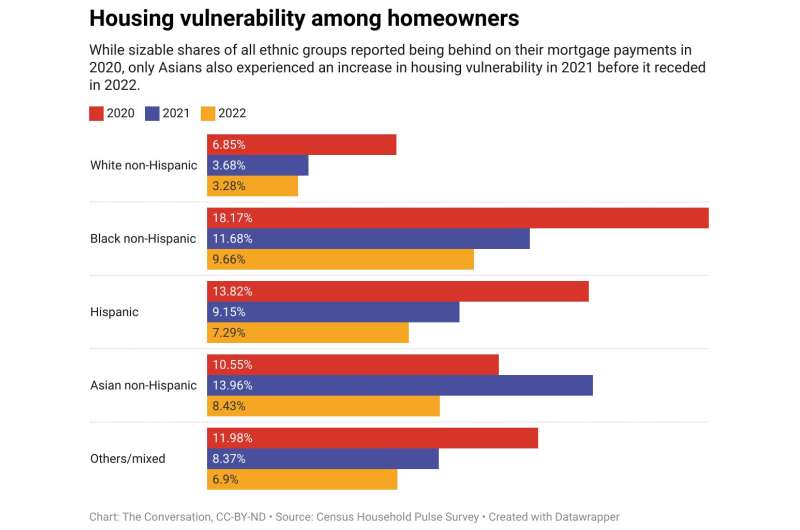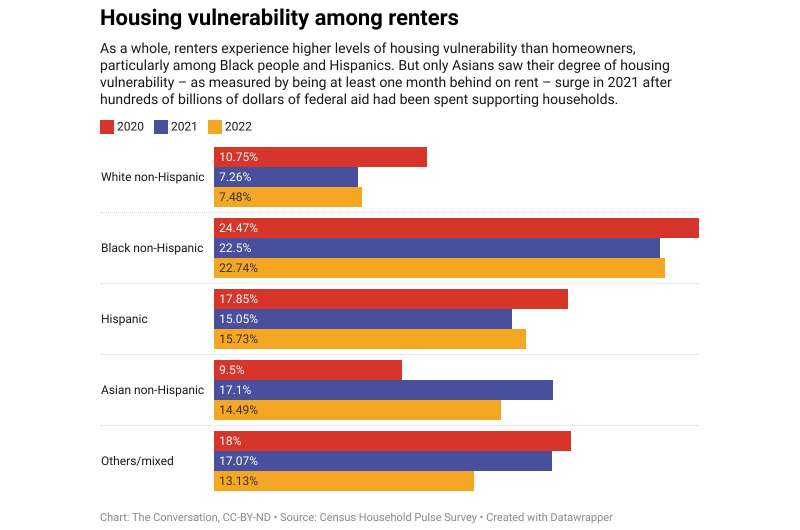This article has been reviewed according to Science X's editorial process and policies. Editors have highlighted the following attributes while ensuring the content's credibility:
fact-checked
trusted source
written by researcher(s)
proofread
COVID-19's housing crisis hit many Asians in the US hardest, but only after government aid began flowing

People of Asian descent living in the U.S. experienced an increase in housing vulnerability in 2021—as measured by the share who said they had fallen behind on their rent or mortgage payments—even as the government spent more than US$5 trillion trying to relieve the COVID-19 pandemic's burden on Americans. Meanwhile, housing vulnerability among white people, Black people and Hispanic people all fell during this period.
These are the main findings of our recent working paper that examined housing vulnerability during the pandemic.
The massive upheaval sparked by the pandemic in early 2020 put millions out of work and made it harder for many people to afford basic necessities like rent amid government-imposed lockdowns. In December 2020, over 2 million homeowners were more than three months behind on their mortgage payment, and 8 million renters were behind on their rent, according to a March 2021 Consumer Finance Bureau report.
We wanted to better understand what was driving this degree of housing vulnerability, how that changed during the pandemic and across ethnic groups, and how it differed between renters and homeowners. To find out, we examined data from the Census Household Pulse Survey, which has sought to quickly measure the social and economic toll from the pandemic in frequent surveys, for three different periods: April/May 2020, April/May 2021 and April/May 2022.
We found that housing vulnerability was high for all groups in early 2020 as the first financial shock of the pandemic struck, though people of color and renters were especially hard hit.
Among homeowners, the overall share of people who said they were not caught up on their mortgage payments was elevated in 2020 but declined in 2021 as government aid helped relieve household hardships. An exception was for homeowners of Asian descent, who reported even higher levels of housing vulnerability in 2021—and more than any other group. By 2022, housing vulnerability had come down for all groups.

The picture was much worse for renters. About 25% of Black renters reported being behind on rent in 2020, compared with 18% for Hispanic respondents and 9.5% for Asians. While the figure fell slightly in 2021 for Black people and Hispanics, the share soared for Asians to 17.1%. The figures stayed elevated in the double-digits for all groups except for white people in early 2022.
An additional econometric analysis we conducted, which adjusted the data for levels of education, income levels and other factors, confirmed our results.
Housing vulnerability is an important measure to look at because it signals someone may be at risk of losing their home, whether they're an owner or a renter. In addition, research shows there's a link between housing vulnerability and other negative health outcomes, such as higher stress levels and mental distress.
Our own research uncovered disparities in how different groups experienced this vulnerability during the pandemic, when the government was spending trillions to support families and businesses. It suggests some groups benefited more than others from these relief efforts.
Our study didn't reveal why Asian housing vulnerability increased from 2020 to 2021 and why this group of people didn't seem to benefit as much from the federal aid as other groups did.
An August 2020 McKinsey report suggested aid to Asian small businesses would likely lag behind other groups due to language barriers or a lack of understanding of the system. The same thing might be true for aid to households as well.
In our future research, we plan to investigate what factors contributed to the rise in housing vulnerability among Asians relative to other groups. We believe it's important for policymakers to examine these issues in hopes of making future aid programs more equitable.
Provided by The Conversation
This article is republished from The Conversation under a Creative Commons license. Read the original article.![]()





















